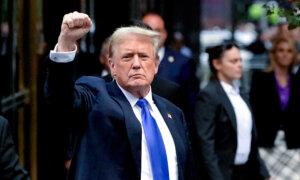Prosecutors argue that the former president may threaten ’the integrity of the judicial proceedings’ and ‘interfere with the fair administration of justice.’
The Manhattan District Attorney’s office urged a state judge on June 4 to keep former President Donald Trump’s gag order in place even after his criminal trial concluded with a guilty verdict on May 30.
In a brief letter, prosecutors argued the gag order was necessary not only for the duration of the trial but also “to protect against defendant’s efforts” to threaten “the integrity of the judicial proceedings,” “interfere with the fair administration of justice,” and “intimidate this Court.”
The parties are now requesting permission to file formal motions and responses to argue their opposing stances on the gag order.
The gag order issued by Justice Merchan is the third and broadest of the gag orders imposed on President Trump as he campaigns for reelection.
Prosecutors in a separate case recently made a request for what would be a fourth gag order on the presumptive Republican candidate for president, in the classified documents case in the Southern District of Florida.
“An enforced silence, however limited, solely in the name of preserving the dignity of the bench, would probably engender resentment, suspicion, and contempt much more than it would enhance respect,” defense counsel wrote, citing the same case Justice Merchan cited to justify the gag order on President Trump.
Trial Over
On May 31, President Trump’s attorney Todd Blanche told the Associated Press he was under the assumption that the gag order had expired with the conclusion of the trial, but would seek clarification from the court.
President Trump had given a press conference that day, referring to the actions of and his relationship with ex-lawyer and prosecution witness Michael Cohen without naming him.
“I don’t want President Trump to violate the gag order,” Mr. Blanche said. “I don’t think it applies anymore. I feel like the trial is over and it shouldn’t.”
“It’s a little bit of the theater of the absurd at this point, right? Michael Cohen is no longer a witness in this trial,” Mr. Blanche added. “The trial is over. The same thing with all the other witnesses. So, we’ll see.
“I don’t mean that in any way as being disrespectful of the judge and the process. I just want to be careful and understand when it no longer applies.”
Defense attorneys argued that the order violated President Trump’s First Amendment rights to protected political speech.
The mid-level appeals court had, referring largely to a federal appeals court decision, ruled that “the right of persons related or tangentially related to the criminal proceedings from being free from threats, intimidation, harassment, and harm” outweighed his right to political speech about figures related to the case.
The judge’s upcoming order, and the appeals court’s response, may be a test of judicial authority.
There is no longer the risk of intimidating potential witnesses from participating at trial, but President Trump, who did not testify in court, implied during his post-conviction press conference that he was still unable to set the record straight on his account of the events presented at trial because of the gag order.
Gagged During Debate?
President Trump was first gagged by another New York Supreme Court justice during a civil trial last fall, and the order had been narrowly tailored to prohibit public statements about one court staffer.
Following that order, U.S. District Judge Tanya Chutkan issued a broad gag order prohibiting parties from making public statements about parties involved in the federal election interference case.
At the time, President Trump was still facing a full roster of rivals for the Republican nomination and the appeals court judges questioned whether the contours of the trial court order would allow President Trump to participate in a political debate, as was his right.
The appeals court narrowed the order enough to allow President Trump to criticize special counsel Jack Smith publicly. It also, in addressing off-the-cuff responses in potential debates, specified that statements had to have been made with the intent to interfere with the case to qualify as a gag order violation.
While the federal appeals court noted that the prosecutors were public figures who reasonably could be subjected to public criticism, the New York gag order prohibits President Trump from speaking about prosecutors other than Manhattan District Attorney Alvin Bragg.
President Trump has still made several references to prosecutor Matthew Colangelo in claiming that the case was politically motivated, without using Mr. Colangelo’s name.
When President Trump faces off with President Joe Biden in a debate later this month, the trial is likely to come up, as well as accusations that the criminal cases are a form of political warfare.
Original News Source Link – Epoch Times
Running For Office? Conservative Campaign Consulting – Election Day Strategies!


